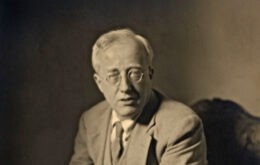Holst, Gustav
Gustav Holst was a star among British composers

In March 1932, halfway through a hectic visit to the United States to conduct various orchestras and to teach at Harvard, Gustav Holst succumbed to a bleeding stomach ulcer and nearly died. As he subsequently recounted it to Ralph Vaughan Williams: ‘I felt I was sinking so low that I couldn’t go much further. And, as I have always expected, it was a lovely feeling… As soon as I reached the bottom, I had one clear, intense and calm feeling – that of overwhelming gratitude. And the four chief reasons for gratitude were music, the Cotswolds, RVW, and having known the impersonality of orchestral playing.’
That Holst found the near-death experience something of a release is not so surprising after decades of chronic overwork. Nor were his first three reasons for gratitude unexpected. Music had possessed him so completely since childhood that it was all the same to him whether he was elaborating The Hymn of Jesus (1917) in his soundproof room at St Paul’s Girls’ School or listening to competitive brass bands rollicking through one of his suites; whether he was conducting the Boston Symphony Orchestra in a Haydn symphony or coaxing thousands of war-weary troops in the Middle East to sing madrigals. What mattered was the involvement. In fact, he regarded the fame and attention that the impact of The Planets (1914-16) brought him in the 1920s as a downright nuisance.
Holst first met Vaughan Williams as a fellow student at London’s Royal College in 1895 and this was rapidly to develop into one of the most fruitful friendships in the history of British music. By the time they met, Holst was already a professional trombonist and Vaughan Williams was to rely on his technical advice in matters of orchestral scoring to the end. In the other direction, it was Vaughan Williams’s fieldwork and two-year stint editing the English Hymnal that awoke Holst’s interest in folkdance and folksong, in plainchant and hymnology. Both composers were enthused by the visionary verse of Walt Whitman and the socialist message of William Morris, while also being involved in the rediscovery of Tudor church music and Purcell.
True, there was a period in the 1920s when they seemed to be drifting artistically apart, but the personal friendship never failed. Stunned by Holst’s unexpected death from heart failure a couple of days after an apparently successful operation on that same gastric ulcer in May 1934, Vaughan Williams wrote that ‘my only thought is now which ever way I turn, what are we to do without him – everything seems to have turned back to him – what would Gustav think or advise or do…?’
But what of that fourth reason for Holst’s gratitude: ‘having known the impersonality of orchestral playing’? It raises the enigma of his personality. By all accounts – not least, the biographical writings of his daughter Imogen – he was a generous, approachable man, wholly innocent of intellectual or social snobbery. In his twenties, he was drawn to Hindu mythology, actually learning Sanskrit in order to make his own translations from the Rig Veda, while The Planets was inspired by a fascination for astrology. For Holst, the function of the composer was not so much to express his or her personality as to serve as a kind of supra-personal receptor to potentially musical impulses from all around, and, not least – though Holst himself seems to have remained essentially agnostic – from above.
The moment Holst entered music education in 1903, it almost took over his life. Soon he was not only teaching at two girls’ schools but at institutes for working-class adults (such as Morley College) in the evenings and organising massive extension projects, such as the first modern performance of The Fairy Queen by Purcell in 1911.
Holst’s own composing was largely confined to Sundays and a few summer weeks. As a result, his evolution tended to proceed fitfully, marked by absorbing a series of influences. Overwhelmed by Wagner in his student years, he later tried to dismiss the more Romantic products of his twenties as “early horrors”. Yet in the perfervid tone poem Indra (1903) and the visionary The Mystic Trumpeter (1904), one already hears his characteristic non-sensual radiance of sound subsuming the influence of Tristan and Parsifal.
If the landscape evocation of A Somerset Rhapsody (1907) represents Holst’s definitive ‘long shot’ on folksong, his oriental suite Beni Mora (1910) and massive choral work The Cloud Messenger (1910-12) exploits scales and rhythms picked up on holiday in Algiers. Most striking is the Schoenbergian provenance of The Planets itself, for there seems little doubt that the concept and many details in the score – the celeste arabesques in 'Venus'; the strange harmonic oscillations in 'Neptune' – were inspired by Schoenberg’s revolutionary Five Orchestral Pieces, which hit London just before the war.
Following the transcendental brightness of The Hymn of Jesus (1917), one can only lament the ensuing years of ill-health that so frustrated his fulfillment. Yet Egdon Heath (1927) and the Lyric Movement (1933) for viola and small orchestra transmuted the old folklorism into a new, haunting austerity: his Choral Fantasia (1930) and Hammersmith (1930) for military band epitomise his harmony and counterpoint at their most fiercely empirical, while the tough ebullience of the Scherzo (1933-34) for the Symphony he was never to complete suggests that his death could not have come at a worst moment.
Holst’s truncated final period might be an incomplete synthesis, yet he can be suspected of having catalyzed vital aspects of Britten’s development, inspiring Tippett’s visionary tendencies and the topographical bleakness of Birtwistle. One only has to think of The Planets’s huge impact on Hollywood film scores to know that Holst’s potential to influence remains undimmed.
Bayan Northcott



